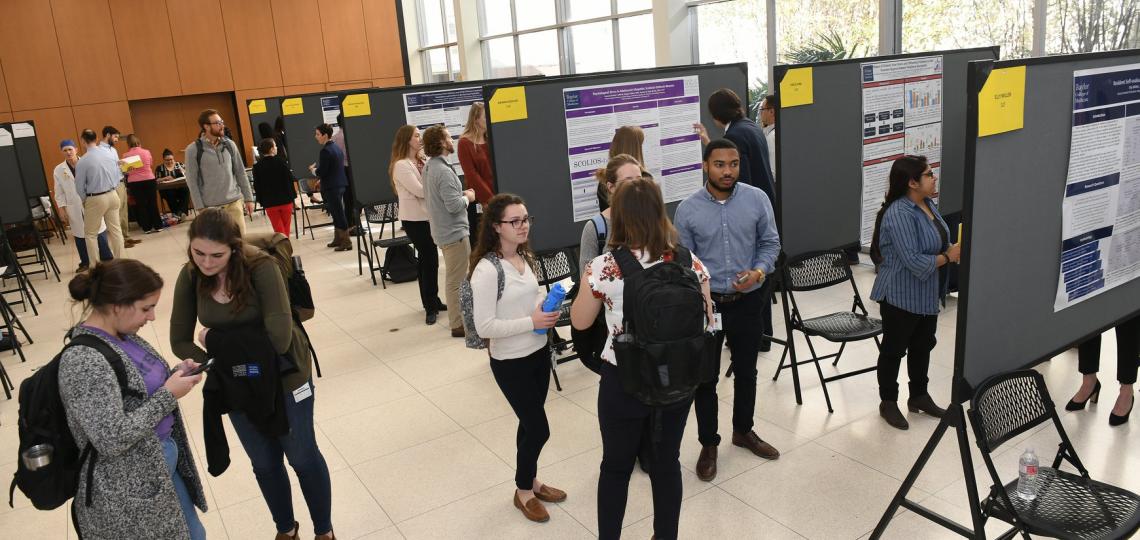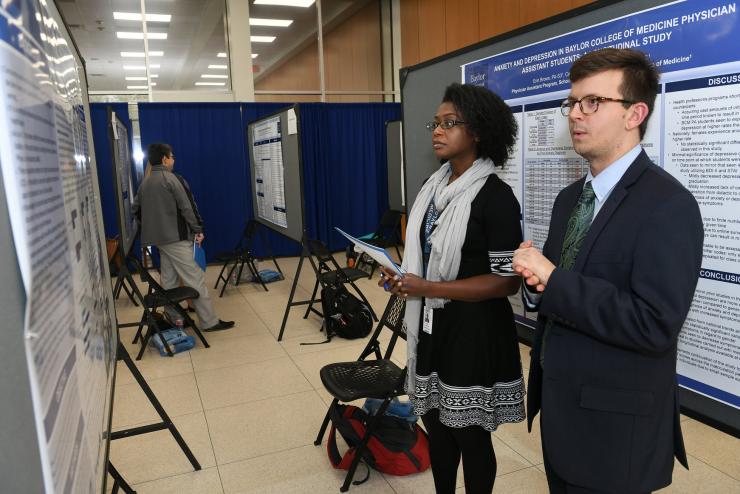
Evidence-based practice has emerged as the standard by which established and future providers will be expected to execute the delivery of medical care. Several learning experiences are used to develop the student’s ability to identify questions to be answered through investigation and properly convey their findings to others. These skills are essential to engaging in practice-based learning and improvement over the course of one’s professional career.
The longitudinal Master’s Paper Project experience is comprised of five required learning activities that begin mid-way during the didactic phase of the curriculum and end just days prior to graduation. These learning experiences include the Health Research Methods course, two four-week research seminars, the master’s paper, and the poster presentation. The project is introduced to incoming students at the time of the new student orientation on the second day they matriculate in the program. During future meetings with their assigned faculty advisors, each student is queried about their ideas and interests in an effort to help shape their early thoughts about a potential area for research.
Research Course Descriptions
Knowledge of the research process is explored in-depth during the Research I Course. It is used to evaluate the quality of published literature dealing with disease diagnosis, prognosis, treatment, harm and cost-effectiveness. Following completion of the course, students will identify, investigate, and answer a question using the research method coupled with statistical strategies under the mentorship of two faculty members with expertise in the area under investigation.
Research I (PARS1-71531)
This course will introduce the principles of human research methodology and explore the impact that different types of human research have on clinical practice and the health care system. Students will develop an understanding of the skills necessary to critically review medical literature, design research study, apply medical and epidemiologic methods, prepare protocols, approach data generation, manage data, perform data analysis, conduct subject follow-up, address quality assurance concerns, and adhere to ethical, legal, and regulatory issues involved in human-subject research. In addition, the course will introduce applied biostatistical principles necessary to plan and execute a clinical or outcomes-related research project with an emphasis on interpreting results stated in the medical literature, organizing alpha-numeric data, and completing fundamental statistical analyses.
Credit: 1 semester hour
Course Director: Carl Fasser
Course Offered: Fall 2, Terms 1AB-2AB
Research II (PARS2-74541)
This faculty-guided research seminar is devoted to the refinement of strategies for the evidenced-based search and interpretation of scientific literature; critique of study designs for IRB-approved student research projects involving the prospective and retrospective collection and analysis of data; resolution of questions surrounding database construction and data entry verification; draft of the introduction, background and methods sections of the Master’s Paper; and the development of skills at the oral presentation and defense of research results. Critical review and interpretation of the scientific literature begun in the Health Research Methods courses is extended in this seminar course. Students can give undivided attention during this time because they do not have clinical responsibilities.
Credit: 4 semester hours
Course Director: Carl Fasser
Course Offered: Spring 2, Terms 3B-5B and Fall 3, Terms 6A-6B
Research III (PARS2-74551)
This faculty-guided research seminar is devoted to the refinement of strategies for the evidenced-based search and interpretation of scientific literature; critique of study designs for IRB-approved student research projects involving the prospective and retrospective collection and analysis of data, draft of the results, discussion and conclusion sections of the master’s paper; preparation of the poster for presentation, and practice of the oral l presentation and defense of research results. Students can give undivided attention during this time because they do not have clinical responsibilities.
Credit: 4 semester hours
Course Director: Carl Fasser
Course Offered: Fall 3, Terms 6B-6E
Master Paper (PAMPP 74800)
Practice-based learning and improvement using evidence constitutes one of six core competencies that should be exhibited by future entry-level PA providers. The intent of the longitudinal Master’s Paper Project is to provide students with knowledge of study designs and statistical methods needed to understand clinical information, the ability to locate, critically appraise, and integrate evidence from scientific studies into clinical practice activities, to use technology to analyze and manage information on a longitudinal basis, and to review practice experiences using a systematic method in concert with other team members as a means of improving the outcomes of care.
Course Credits: 4 semester hours
Course Director: Carl Fasser
Course Offered: Fall 3
Research Emphasis

Following completion of the HRM course and prior to the end of the didactic phase of the curriculum each student must identify a topic for their research. Research leading to the master's paper can involve:
- Retrospective chart reviews to answer questions regarding clinical outcomes or to further interpret and compare laboratory results with current practice protocols
- Prospective studies assessing outcomes of a clinical or educational intervention
- Surveys to gather data on issues such as physician assistant attitudes, roles, and/or education or patient satisfaction regarding a clinical or educational intervention
- Meta-analyses/case studies to draw upon the results of other research and literature reviews in addressing specific research question, or
- Other research deemed appropriate by the student's research mentors and the program director
Admissions
Ready to take the next step toward your career goals? Apply today.








